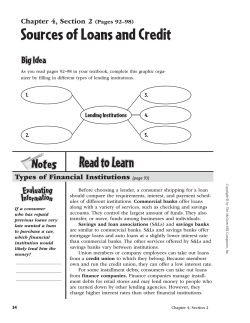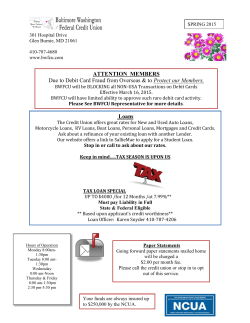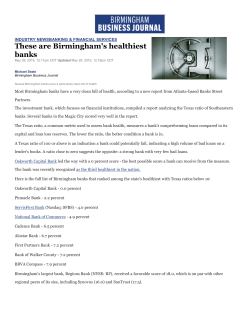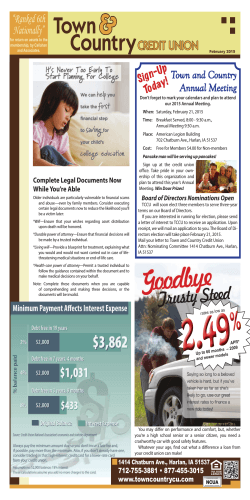
Apr 3 2015 - Americans for Financial Reform
This Week in Wall Street Reform – Mar. 28-Apr. 3, 2015 Please share this weekly compilation with friends and colleagues. To subscribe, email erin@ourfinancialsecurity.org, with “This Week” in the subject line. CONSUMER FINANCE & THE CFPB New Proposals to Rein in Payday Loans Show Why Unscrupulous Corporations Want You to Hate Government Ian Reifowitz, HuffPost Politics, 3/31/15 The proposals would mandate that lenders actually look at the obligations and incomes of would-be borrowers similar to the way they do with mortgages and other kinds of loans, so that people who are unlikely to be able to repay their debts don't end up in a situation like Trudy Robideau. The CFPB looked at 15 million short-term loans and reported that fewer than one in five were paid off on time. Clearly, this is an industry where taking advantage of financially vulnerable people is standard practice. Here's another doozy: when a borrower doesn't pay on time, lenders can currently just take what they are owed right out of the person's bank account, often leading to bounced checks and additional charges that leave the borrower even worse off. No more, if these proposals are adopted, as lenders would have to notify the borrower three days before taking funds out of an account. As for these loans being used to cover one-time expenses -- which is how the industry pitches their product -- almost seven in 10 borrowers used the money to cover recurring bills while only one in six borrowed for true, one-time emergencies, according to the Pew Charitable Trust. Birmingham becomes center of the payday lending debate, y'all Samuel Friedman, AL.com, 4/2/15 At Least We’re Not the Mafia Alexis Goldstein, Bull Market, 3/30/15 Their interest rates are astronomical: the annual interest on a two-week payday loan ranges from 391 to 521%. And average annual interest rate matters because 4 out of 5 payday loans are rolled over, often trapping customers in a cycle of debt. As a result, payday lenders have faced increasing scrutiny: their rates were capped in the United Kingdom this year, and payday lenders are banned outright in 14 U.S. states and the District of Columbia. Now, the Consumer Financial Protection Bureau (CFPB), with the backing of President Barack Obama, has made a first step towards federally regulating the industry. But despite the Administration’s coordinated effort, it’s unclear if they’ll succeed. And that’s because this is an industry that knows how to lobby, and how to buy off its critics. The push to eliminate predatory lending Charlene Crowell, Daytona Times, 4/2/15 Consumer Protection Agency Seeks Limits on Payday Loans Logan Koepke, Equal Future, 4/1/15 Study finds high default rates in payday lending Lydia Wheeler, The Hill, 3/31/15 Expanding payday lending hurts, not helps, consumers Stephanie Bowman, Seattle Times, 3/28/15 Prosecutors scrutinize minority borrowers’ auto loans Michael Corkery & Jessica Silver-Greenberg, N.Y.Times Minority borrowers were once starved for credit through redlining — banks’ refusal to provide mortgages in their communities. Now the booming auto industry has turned that historic wrong on its head, government authorities say, singling out minority borrowers and extending them the costliest car loans, a development that threatens to exacerbate the economic distress in some black and Hispanic neighborhoods. The practice, known as reverse-redlining, is presenting new challenges for government authorities trying to shield the most vulnerable Americans from predatory lending. Prosecutors from the Justice Department and top officials with the Consumer Financial Protection Bureau are grappling with how to root out the practice in a fractured industry, where some of the least regulated players, the auto dealers, wield the most power and where virtually no national data exists to quantify the problem. See more payday coverage New Metric Aids Weak Credit Risks Annamaria Andriotis, WSJ, 4/1/15 A new kind of credit score for those with no credit Jonnelle Marte, Washington Post, 4/2/15 Nudging Credit Scores In The Field: The Effect Of Text Reminders On Creditworthiness In The United States Anat Bracha and Stephan Meier, Boston Fed Working Paper, Proposed Prepaid Regulation Could Hurt the American Consumers it is Supposed to Protect H. West Richard, Roll Call, 4/2/15 ENFORCEMENT SEC Charges KBR With Violating Whistleblower Protection Rule Rachel Louise Ensign, Wall St. Journal, 4/1/15 See SEC settlement. Preet Bharara’s Methods Editorial, Wall St. Journal, 3/29/15 EXECUTIVE COMPENSATION Wall St. blasted for paying execs to work for Uncle Sam Kaja Whitehouse, USA Today, 4/1/15 In the coming months, four Wall Street banks — Goldman Sachs, Citigroup, Morgan Stanley and JPMorgan — will face shareholder votes on proposals demanding more information about the practice, which the proposal's sponsor has dubbed "government service golden parachutes." "While entering government service is a laudable career choice, we question why shareholders should subsidize the second career choices of executives," union group AFL-CIO, the proposal sponsor, said in a letter Tuesday to shareholders. Top CEOs reaped billions from stock gains in recent years Tim McLaughlin & Ross Keyber, Reuters, 3/29/15 THE FEDERAL RESERVE IMF Finds Gaps in U.S. Insurance Regulation Ryan Tracy, Wall St. Journal, 4/2/15 U.S. financial regulators have made significant progress in improving oversight of the banking industry but have work to do to close gaps in insurance regulation, the International Monetary Fund said in a pair of reports released Thursday. The Federal Reserve’s new program for supervising large insurance firms is “proceeding slowly” and “needs to strike out in its own direction,” the report said, nodding to the fact that the U.S. central bank still hasn’t drafted rules for the insurance companies it’s tasked with overseeing as a result of the 2010 Dodd-Frank law. Yellen to allow public comments on insurance regs Kevin Cirilli, The Hill, 4/1/15 HOUSING AND MORTGAGES Warren Buffett's mobile home empire preys on the poor Daniel Wagner, Center for Public Integrity, 4/3/15 Buffett’s mobile home empire promises low-income Americans the dream of homeownership. But Clayton relies on predatory sales practices, exorbitant fees, and interest rates that can exceed 15 percent, trapping many buyers in loans they can’t afford and in homes that are almost impossible to sell or refinance, an investigation by The Center for Public Integrity and The Seattle Times has found. Monitor credits half of JPMorgan relief under mortgage deal Jon Prior, PolititoPro (paywalled), 4/2/15 Cause of the Financial Crisis Phil Angelides, Letter to NY Times, 3/27/15 There is a reason that Peter Wallison’s “passion” to rewrite the history of the 2008 financial crisis is a “lonely quest” (“A Crusader Against the Common View of the Financial Crisis,” by William D. Cohan, Street Scene column, nytimes.com, March 12). The evidence presented by the Financial Crisis Inquiry Commission contradicts his revisionist view of the crisis. All nine of his fellow commissioners — five Democrats, three Republicans and one independent — rejected his theory that government housing policies were the primary cause of the crisis. The data shows that Fannie Mae and Freddie Mac followed, rather than led, Wall Street in expanding subprime lending. Delinquency rates for loans purchased or securitized by Fannie and Freddie were dramatically lower than for mortgages securitized by Wall Street. And Fannie and Freddie mortgage securities, with their implicit government backing, undisputedly did not cause the losses that cascaded through the big Wall Street financial firms. POLITICAL INFLUENCE OF WALL STREET Schumer and Wall Street: It’s complicated Zachary Warmbrodt and Jon Prior, Politico Pro, 3/27/15 Once viewed as a reliable ally of banks and financial firms, Schumer has had a strained relationship with financiers in the wake of the financial crisis as progressives in his party have been heavily critical of Wall Street and skeptical of any lawmakers lending it a hand. On Wall Street, Dem shake-up puts party at crossroads Peter Schroeder, The Hill, 3/29/15 Bank threat to Democrats backfires Darrell Delmaide, Pensecola News Journal via USA Today, 3/31/15 Elizabeth Warren Strikes Back as Citigroup Tries to Blackmail the Democratic Party Yves Smith, Naked Capitalism via Truthout, 3/30/15 Elizabeth Warren: 'I Got News' for Wall Street Banks: 'Bring it On' Dan Weil, Newsmax, 4/2/15 O'Malley: Presidency no 'crown to be passed between 2 families' Kevin Robillard, Politico, 3/29/15 O’Malley, who endorsed Clinton over President Barack Obama in 2008, had shunned questions about Clinton since he left office early this year. But he has lately stepped up his attacks on Wall Street, potentially attempting to woo supporters of Sen. Elizabeth Warren (D-Mass.) and highlighting an area where Clinton is weak with progressives. “Right now, it’s not even a fair fight. It’s as if Wall Street owns one party and is trying to totally intimidate the other,” O’Malley said. “We need to stand up and put the national interest first.” Did JPMorgan Try to Bribe Dem Power-Brokers? (Depends What Your Definition of 'Bribe' Is) Ari Rabin-Havt, 3/30/15 Did one of the largest banks in the United States accidentally acknowledge an attempt to bribe members of Congress? A widely published Reuters story reported that four major U.S. banks have threatened to withhold expected campaign contributions from the Democratic Senatorial Campaign Committee unless “Democrats, including [Massachusetts Senator Elizabeth] Warren and Ohio Senator Sherrod Brown ... soften their party's tone toward Wall Street.” But the article specifically notes: “JPMorgan representatives have met Democratic Party officials to emphasize the connection between its annual contribution and the need for a friendlier attitude toward the banks, a source familiar with JPMorgan's donations said. In past years, the bank has given its donation in one lump sum but this year has so far donated only a third of the amount, the source said.” A person familiar with JPMorgan's donations—who may or may not be a JPMorgan representative—told a Reuters reporter that JPM told party officials: Be more friendly to banks if you want us to give you the remaining two-thirds of the contributions you were expecting from us. Even shorter: We are offering you a specific sum of money for specific action—which may simply amount to mouthshutting and smiling—from members of the Senate. Lining Washington's Pockets to the Tune of $1.4 Billion Think Advisor, 4/2/15 The findings come from Americans for Financial Reform's “Wall Street Money in Washington” report, released in late March. The report draws on data from the Center for Responsive Politics (CRP), which tracks and categorizes campaign contributions and lobbying expenditures, as well as contributions reported to the Federal Elections Commission (FEC) and the Senate Office of Public Records. STUDENT LOANS & FOR PROFIT EDUCATION A revolt is growing as more people refuse to pay back student loans Danielle Douglas-Gabriel, Washington Post, 3/30/15 Remember those 15 people who refused to repay their federal student loans? Their “debt strike” has picked up 85 more disgruntled borrowers willing to jeopardize their financial future to pressure the government into forgiving their student loans. And the government is starting to listen. 'Corinthian 15' Becomes 'Corinthian 100' As Federal Student Debt Strike Grows Shahien Nasiripour, Huffington Post, 3/30/15 Graduates of Corinthian Colleges refuse to pay back student loans CBS This Morning, 4/1/15 Students from Troubled For-Profit Colleges Refuse to Pay Back Loans Audie Cornish, NPR, 3/31/15 Student debt revolt is growing among Corinthian Colleges attendees, graduates Keegan Kyle, Orange County Register, 3/31/15 Student Debt Strikers Grow in Number and in Power Kate Aronoff, Truthout, 4/1/15 Student loan recipients on repayment strike Kimberly Hefling, AP via Military Times, 3/31/15 For-Profit College Enrollment Is Down Following Scandals & School Failures Ashlee Kieler, The Consumerist, 3/31/15 U.S. Will Release Remaining Colleges Under Scrutiny Inside Higher Ed, 4/2/15 New York City Consumer Agency Investigating Four For-Profit Colleges Elizabeth A. Harris, 4/2/15 For-Profit Colleges: Here to Stay Bourree Lam, The Atlantic, 4/3/15 100 Victims Of For-Profit College Scam Refuse To Pay Debts, Forcing Feds To Come To The Table Alan Pyke, ThinkProgress, 3/31/15 Stop Giving High-Risk, Low-Reward Student Loans Megan McArdle, Valley News, 4/2/15 SYSTEMIC RISK Use Tiered Regulation to Preserve Small Banks, Keep Big Ones in Line Arthur Wilmarth, American Banker, 4/2/15 Congress should establish a new two-tiered system of banking regulation to correct the perverse effects of our current regime. A two-tiered system would encourage community banks and smaller regional banks to maintain their relationship-based business model. SEC Official: ‘Not Clear’ Bank Regulation Has Made Economy Safer Ryan Tracy, WSJ, 4/1/15 A top Federal Reserve official is suggesting tougher rules for shadow banks Michael Flaherty and Howard Schneider, Reuters via Business Insider, 3/30/15 "It is widely understood that any regulation of non-banks should fit their activities and the vulnerabilities they pose, which implies that not every non-bank financial institution or activity necessarily needs to be regulated," Fischer said in prepared remarks at an Atlanta Federal Reserve Bank event in Stone Mountain, Georgia. Fed’s Lockhart Endorses Raising $50 Billion Level for Tougher Bank Rules Ryan Tracy, WSJ, 4/1/15 Some banks above the $50 billion threshold “individually at least do not represent systemic risk, so I think the threshold should be raised,” he told reporters at a conference here. “I don’t have a number, but certainly higher than $50 billion.” Fed’s Fischer floats shadow bank regulation framework Michael Flaherty and Howard Schneider, GNOMES
© Copyright 2025













